
When the coronavirus put Wall Street on pause, the clock didn’t stop on special-purpose acquisition companies (SPACs), which have a finite amount of time to find a target. Many of them were able to find a solution – ask investors for an extension.
A total of 28 extensions have been granted on SPACs so far in 2020, already setting a new record from 26 in 2019, according to Sidley Austin LLP, a frequent advisor on IPOs and M&A. SPACs that extend generally compensate investors with a couple of pennies per $10 share – an amount that actually means something in an zero interest rate environment.
With around $20 billion in cash sitting in SPACs and more coming to market with IPOs, the keg of dry powder continues to get bigger. But Sidley attorneys say the amount of money isn’t a cause for concern.
“The amount being raised relative to private equity funds is fairly modest,” said Jeffrey Smith, a partner in Sidley’s and Private Equity practice.
Indeed, at various times, private equity funds have had had hundreds of billions in dry powder. Private equity funds usually have 10 years to invest and return capital to investors, and themselves occasionally ask for extensions.
The arrangement with SPACs is somewhat different. Typically, SPACs raise money in an IPO at $10 per unit (which includes a share and a fraction of a warrant) and keep the cash in trust. They have a fixed amount of time to find a deal, and investors have the option of getting their money back with interest or taking shares in a newly-formed company.
“What’s different about SPACs is that they usually have 18 to 24 months to complete a business combination,” Mr. Smith said. “So when you lose several months – especially towards the end of a SPAC’s term – it’s a significant setback.”
The extensions aren’t all a result of the pandemic. “You might have expected a record year in extensions, but perhaps not as fast as it’s happened,” Mr. Smith said. “Part of the ramp up in extensions is natural because there were so many more SPACs that raised money in 2018 than prior years. More than half of the extensions this year were in the works or approved by stockholders before COVID was a major story.”
In recent weeks, SPAC fundraising has charged ahead. “SPACs have outpaced all other industry sectors in the IPO market for the last couple years, and 2020 is no exception,” said Michael Heinz, a partner in Sidley’s Capital Markets practice. “Traditional IPOs are way down for the year post-COVID, but there continues to be strong demand for SPAC IPOs.”
And looking ahead, SPACs have attributes that may keep them in favor.
“As markets continue to be volatile, especially approaching the election, combining with an existing publicly traded SPAC may be a more viable and quicker path to access the public markets,” Mr. Heinz said. “SPAC roadshows are shorter and focused mainly on the SPAC management team and their acquisition target criteria, whereas a traditional IPO roadshow lasts a couple weeks and involves a more in-depth review and discussion of the company’s business, growth strategies and historical financial performance.”
MORE: Written Report from Webinar: SPACs – Can They Capitalize on the Current Environment?
Jeffrey Smith is a partner in Sidley Austin LLP’s M&A and Private Equity practice. He represents private equity funds and corporate clients on a broad range of M&A, governance and finance matters.
Michael Heinz is a partner in Sidley Austin LLP’s Capital Markets practice. He represents issuers, underwriters and investors in a wide variety of public and private securities transactions and advises clients on corporate governance and SEC disclosure matters.
Both Jeffrey and Mike have extensive experience representing SPACs, SPAC sponsors, target companies and their PE sponsors, underwriters and financing sources in all aspects of the SPAC life cycle, including IPOs, business combinations and related debt and equity financing transactions.
Contact:
John Jannarone, Editor-in-Chief
editor@IPO-Edge.com
Twitter: @IPOEdge
Instagram: @IPOEdge







